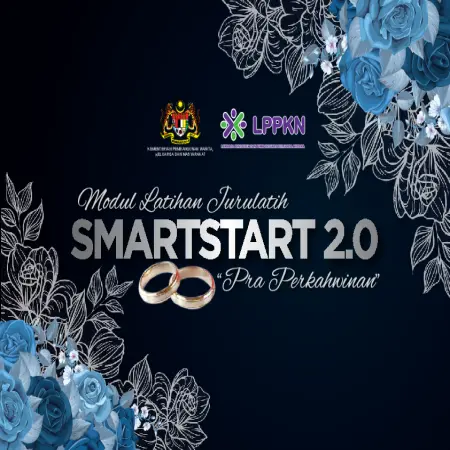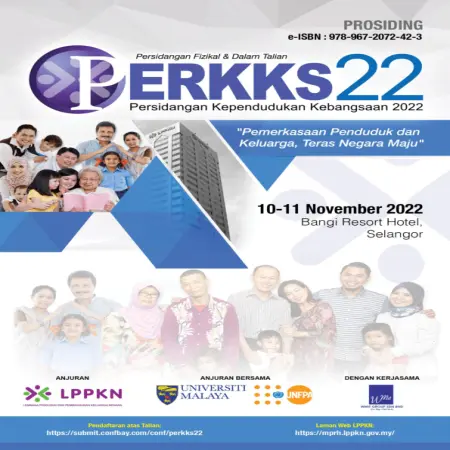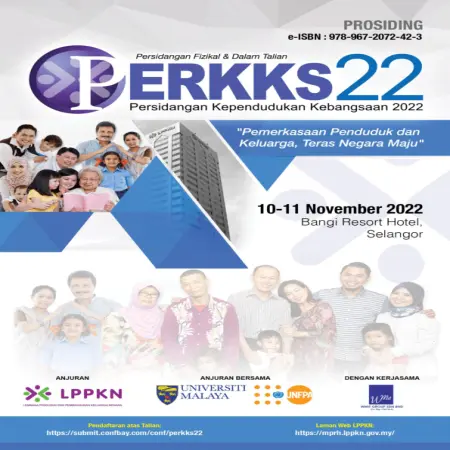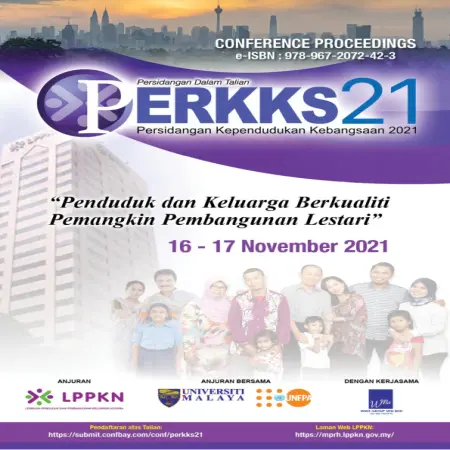TOPICS
Results for Topics : "Marriage"
|
|
Modul Latihan Jurulatih SMARTSTART 2.0 "Pra Perkahwinan"
Item Type: Module
Editor:
Year: 00/01/2022
Abstract: Introduction:-
SMARTSTART 2.0 Pre-Marriage Training the Trainers Trainer Module is a new module that has been processed more neat and organized as a result of creative ideas through the compilation of contents and activities based on observations related to the latest issues that often being the cause of divorce. This module is a standard reference and guideline specially prepared for the use of trainers to facilitate the learning process, teaching and guide the preparation of programme materials. Through this module, it is hoped that it can provide positive benefits especially to individuals or couples who want to get married or who are planning to start a family in order to be more physically, mentally, emotionally, spiritually and financially prepared.
Objectives:
To provide knowledge and skills to the participants about preparations towards marriage.
Program Duration:
2 day program
Target Participants:
Individuals or couples who want/plan to get married.
Interactive Content:
Promising difference through learning and delivery methods. Full involvement of participants through skills training and group activities.
|
|
|
|
|
|
Policy response to the changing marriage institution in Malaysia
Item Type: Book Section
Editor:
Year: 00/00/2022
Abstract: In Malaysia, educational improvement, urbanization, modern sector employment, women empowerment, and migration have brought about dramatic changes in marriage institutions, with the surging of age at marriage, singlehood, and divorce. Between 1970 and 2010, the singulate mean age at marriage among men and women increased from 25.5 years and 22.0 years to 28.0 years and 25.7 years.
|
|
|
|
|
|
Redefining quality interpersonal communication in marriage from divorcees’ perspectives
Item Type: Book Section
Editor:
Year: 00/00/2022
Abstract: Quality interpersonal communication is essential in the development and maintenance of any relationship, including marriage. As society adapts to new avenues of communication, married couples often underestimate the relevance of interpersonal communication in their relationship due to their lack of understanding of quality interpersonal communication. Therefore, this study investigated the conceptualisation of quality interpersonal communication through the lens of Relational Dialectic Theory in marriage from the perspectives of divorcees.
|
|
|
|
|
|
Pendekatan kaunseling disermen dalam menangani konflik perkahwinan era pendemik covid-19
Item Type: Article
Editor:
Year: 00/12/2021
Abstract: Marital conflict management in a quality manner is necessary considering the functionality of the husband and wife is the backbone
to marital bliss. In this paper, the use of the 'Pendekatan Kaunseling Disermen' introduced by William J. Doherty is proposed to be used during counseling sessions involving couples where one party tends to stay and the other tends to divorce, especially in the era of the COVID-19 pandemic.
|
|
|
|
|
|
Communication activities between spouses during covid-19 pandemic
Item Type: Article
Editor:
Year: 00/12/2021
Abstract: Interpersonal communication is vital in every relationship. In this current situation of pandemic Covid 19, movement control orders (MCO) have been implemented by the government. Due to the MCO, people spend more time at home and the communication activities within the family might change as well. Thus, this research will conduct a qualitative method (in-depth interviews) to investigate the communication activities and the effects of those activities between spouses during the pandemic of Covid 19.
|
|
|
|
|
|
Penghayatan islam dan hubungannya terhadap pengabaian qawwamah dalam perkahwinan
Item Type: Article
Editor:
Year: 00/12/2021
Abstract: Qawwamah in marriage is an issue that is often raised when there is domestic conflict. Neglect of qawwamah by the husband will have very big implications for the wife. The emergence of domestic dysfunction is due to the problem of leadership that is not based on the appreciation of Islam. Harmony and happiness are difficult to form without the implementation of Islamic practices applied in household institutions. This study suggests that the appreciation of Islam be used as a model in fostering household leadership that is free from conflict in creating a harmonious and calm atmosphere.
|
|
|
|
|
|
Pencetus utama konflik perkahwinan sepanjang fasa pertama perkahwinan dalam kalangan pasangan muda: kajian kes semasa Perintah Kawalan Pergerakan (PKP)
Item Type: Article
Editor:
Year: 00/12/2021
Abstract: The first phase of marriage is often associated with a crisis phase, an adjustment phase and a stress phase. The success of the young couple through this phase will guarantee the stability of the marriage and the survival of the family institution. Divorce is a major threat to young couples in the early phase of marriage. This study aims to identify triggers of marital conflict during the first phase of marriage (1-10 years) among young couples in the State of Selangor. The results of the analysis show that there are three 93) main triggers of marital conflict among young couples, namely financial crisis, communication problems and family interference.
|
|
|
|
|
|
Perceraian dalam kalangan wanita Melayu Terengganu
Item Type: Article
Editor:
Year: 00/12/2021
Abstract: This article analyzes the issue of divorce claims among Terengganu Malay women. Writing from a social history perspective, focusing on the period from 1963 to 1978 based on the written report of the Besut Kadhi Office obtained at the National Archives of Malaysia Terengganu Branch. The discussion of this article is divided into three parts. First, about background such as place of origin, age, length of time left, marital and family status and partner's occupation. Second, explain the factors that cause women to make complaints to religious parties that are related to the problem of neglecting alimony and responsibilities, polygamy and disappearing for a certain period of time. Third, removing the constraints faced such as hard-to-find couples who have migrated from their original area to a new place outside Terengganu or to another district in Terengganu as well as marriage with a partner from outside Terengganu. The findings of the study show that the Kadhi Besut Office plays an important role in solving problems related to the status of women who are suspended without strings. This study is expected to be able to fill the void in writing about Malaysian social history in general and gender studies in particular in the post-independence era.
|
|
|
|
|
|
Pencetus utama konflik perkahwinan sepanjang fasa pertama perkahwinan dalam kalangan pasangan muda: Kajian kes semasa Perintah Kawalan Pergerakan (PKP)
Item Type: Book Section
Editor:
Year: 01/12/2021
Abstract: The first phase of marriage is often associated with a crisis phase, an adjustment phase and a stress phase. The success of the young couple through this phase will ensure the stability of the marriage and the survival of the family institution. Divorce is a major threat to young couples in the first phase of marriage. This study aims to identify the triggers of marital conflict during the first phase of marriage (1-10 years) among young couples in the State of Selangor.
|
|
|
|
|
|
Correlates and consequences of delayed marriage in Malaysia
Item Type: Article
Editor:
Year: 01/10/2021
Abstract: This paper aims to examine the correlates of age at first marriage and the consequences of late marriage. Data for this paper were drawn from the 2014 Malaysian Population and Family Survey. Simple cross- tabulation and multiple classification analysis were used for the analysis. Age at marriage of women varied across socioeconomic groups.
|
|
|
|














